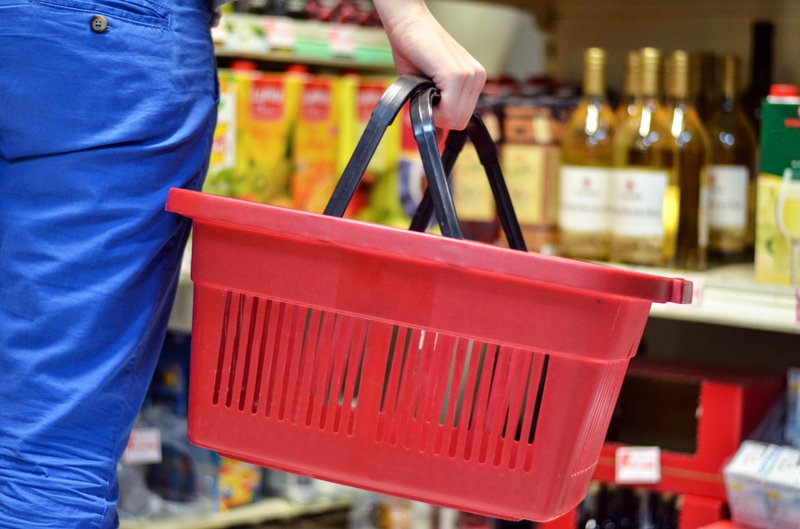Consumer price indices, Slovenia, March 2021
In March 2021, inflation at both the annual (0.1%) and the monthly (0.3%) level
In March 2021, inflation at the annual level was at 0.1% and at the monthly level at 0.3%. The prices of goods increased both at the annual (by 0.3%) and at the monthly (by 0.9%) level, while the prices of services decreased both at the annual (by −0.4%) and at the monthly (by −0.8%) level.
In March 2021 annual inflation at 0.1%
In March 2021, the annual price growth was 0.1% (in March 2020 it was 0.5%), while the 12-month average price growth was −0.6% (in March 2020 it was 1.7%).
In one year, goods prices increased by 0.3%. In this period, the prices of non-durable goods increased by 2.2%, while the prices of semi-durable and durable goods decreased by 5.8% and 0.3% respectively. In one year, the prices of services also decreased (by 0.4%).
The largest impact on the annual inflation (1 percentage point) came from 38.7% higher prices of electricity (in March 2020, electricity prices significantly decreased due to the government decree on temporary non-payment of contributions).
Lower prices of clothing and footwear lowered the inflation by 0.6 of a percentage point. The prices of clothing and footwear were in March 2021 on average 8.8% lower than in March 2020.
Monthly inflation at 0.3%
In March 2021, prices were on average higher by 0.3% than in February 2021.
The biggest impact on the monthly price increase (0.3 p.p.) came from higher prices of petroleum products (the prices of liquid fuels were in comparison to February 2021 higher by 6.1% and the prices of fuels and lubricants by 5.7%). 0.2 p.p. of the impact on monthly inflation came from 3.3% higher prices of clothing and footwear. In the last month, the prices of equipment for sport went up by 14%, which had a 0.1 p.p. impact on inflation.
Lower prices of winter package holidays (by 9.4%) lowered the inflation by 0.3 p.p.
Harmonised indices of consumer prices
Measured with the harmonised index of consumer prices, in March 2021 the annual growth of consumer prices was 0.1% (in March 2020 it was 0.7%). The 12-month average price growth was −0.8% (in the same period last year 1.8%). The monthly price growth was 0.6%.
Service prices in March 2021 were on average 0.4% higher than in March 2020, while goods prices were on average lower by 0.1%. The prices of semi-durable goods decreased by 5.6%, the prices of durable goods on average remained the same, while the prices of non-durable goods increased by 1.3%.
Measured with the harmonised index of consumer prices, in February 2021 the annual inflation rate in the EMU countries was 0.9% (the same as a month earlier). In the EU-27 Member States it was 1.3% (up from 1.2% in January 2021). The lowest annual inflation rate was recorded in Greece (−1.9%) and the highest in Poland (3.6%); in Slovenia it stood at −1.1%.
In March 2021, the annual price growth was 0.1% (in March 2020 it was 0.5%), while the 12-month average price growth was −0.6% (in March 2020 it was 1.7%).
In one year, goods prices increased by 0.3%. In this period, the prices of non-durable goods increased by 2.2%, while the prices of semi-durable and durable goods decreased by 5.8% and 0.3% respectively. In one year, the prices of services also decreased (by 0.4%).
The largest impact on the annual inflation (1 percentage point) came from 38.7% higher prices of electricity (in March 2020, electricity prices significantly decreased due to the government decree on temporary non-payment of contributions).
Lower prices of clothing and footwear lowered the inflation by 0.6 of a percentage point. The prices of clothing and footwear were in March 2021 on average 8.8% lower than in March 2020.
Monthly inflation at 0.3%
In March 2021, prices were on average higher by 0.3% than in February 2021.
The biggest impact on the monthly price increase (0.3 p.p.) came from higher prices of petroleum products (the prices of liquid fuels were in comparison to February 2021 higher by 6.1% and the prices of fuels and lubricants by 5.7%). 0.2 p.p. of the impact on monthly inflation came from 3.3% higher prices of clothing and footwear. In the last month, the prices of equipment for sport went up by 14%, which had a 0.1 p.p. impact on inflation.
Lower prices of winter package holidays (by 9.4%) lowered the inflation by 0.3 p.p.
Harmonised indices of consumer prices
Measured with the harmonised index of consumer prices, in March 2021 the annual growth of consumer prices was 0.1% (in March 2020 it was 0.7%). The 12-month average price growth was −0.8% (in the same period last year 1.8%). The monthly price growth was 0.6%.
Service prices in March 2021 were on average 0.4% higher than in March 2020, while goods prices were on average lower by 0.1%. The prices of semi-durable goods decreased by 5.6%, the prices of durable goods on average remained the same, while the prices of non-durable goods increased by 1.3%.
Measured with the harmonised index of consumer prices, in February 2021 the annual inflation rate in the EMU countries was 0.9% (the same as a month earlier). In the EU-27 Member States it was 1.3% (up from 1.2% in January 2021). The lowest annual inflation rate was recorded in Greece (−1.9%) and the highest in Poland (3.6%); in Slovenia it stood at −1.1%.
Annual growth rates of consumer prices, Slovenia
Source: SURS
Consumer price indices, Slovenia
Source: SURS |
Growth rates of harmonised consumer prices, Slovenia
1) Indices. Source: SURS |
METHODOLOGICAL NOTE
Due to the second wave of the coronavirus epidemic, SURS is still faced with difficulties in data collection.
In March 2021, we collected some retail prices of non-food goods and services by phone and through the websites of providers. Higher quality of the indices was ensured by using scanner data, as we continue to obtain them weekly.
Where prices could not be collected or services were not provided, data were compiled in accordance with Eurostat recommendations, so in some subgroups the published indices are less reliable than usual. The missing prices were imputed by using the price changes of similar products. In some cases, where there are reasons to expect that the prices will be the same once the situation will revert back to normal, the carry forward method was used. For series with seasonal patterns (package holidays and some accommodation services), imputation with monthly change of the previous year was used. The share of imputed data represents 2.2% of the total harmonised index of consumer prices and 4.7% of the total consumer price index.
In March 2021, we collected some retail prices of non-food goods and services by phone and through the websites of providers. Higher quality of the indices was ensured by using scanner data, as we continue to obtain them weekly.
Where prices could not be collected or services were not provided, data were compiled in accordance with Eurostat recommendations, so in some subgroups the published indices are less reliable than usual. The missing prices were imputed by using the price changes of similar products. In some cases, where there are reasons to expect that the prices will be the same once the situation will revert back to normal, the carry forward method was used. For series with seasonal patterns (package holidays and some accommodation services), imputation with monthly change of the previous year was used. The share of imputed data represents 2.2% of the total harmonised index of consumer prices and 4.7% of the total consumer price index.
When making use of the data and information of the Statistical Office of the Republic of Slovenia, always add: "Source: SURS". More: Copyright.

.jpg)


